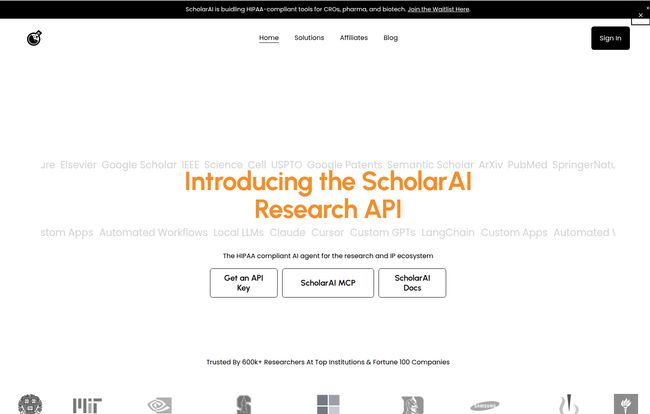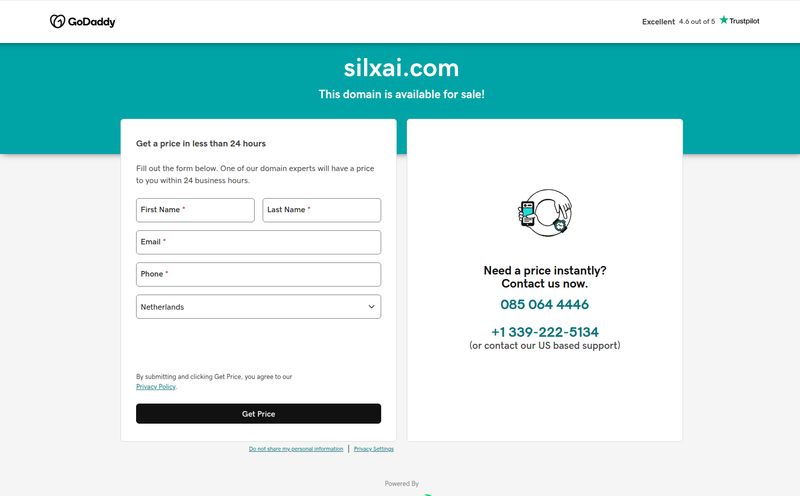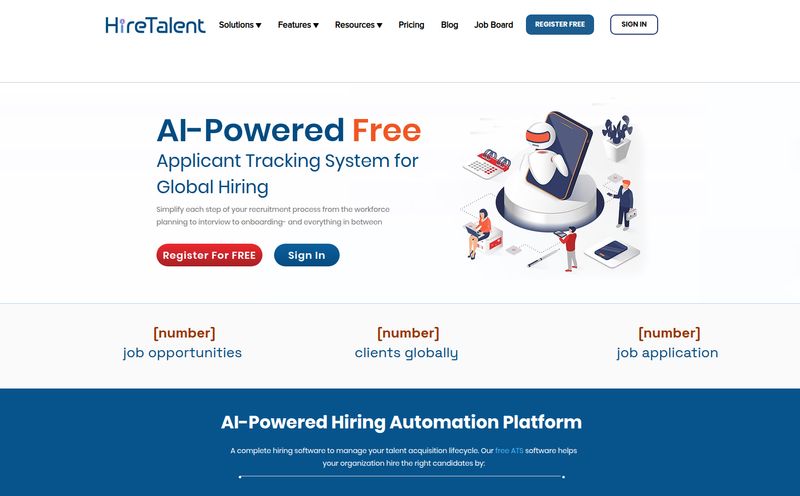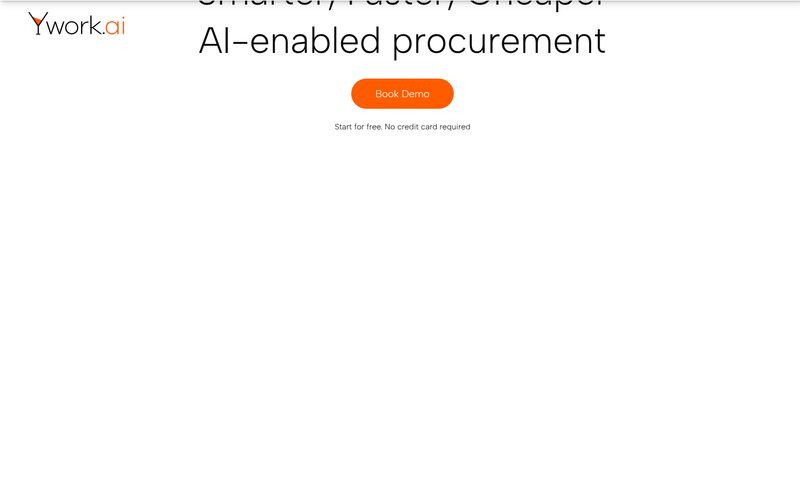I remember my university days... a blurry haze of instant coffee and the glow of a monitor at 3 AM. The enemy? A 20-page reading list for a single class and a blinking cursor on a blank document. The process was always the same: head to Google Scholar, type in some keywords, open 30 tabs, and pray that a few of the abstracts were actually relevant. It was a slog. A necessary, mind-numbing slog.
Fast forward to today, and the game has completely changed. AI isn't just a buzzword anymore; it's a legitimate assistant. We've got tools that can write, code, and design. And thankfully, for all the students and researchers still burning that midnight oil, we have tools like ScholarAI.
I’ve been keeping my eye on this one for a while, especially since its days as a popular ChatGPT plugin. But now that it's a full-fledged, standalone platform, I figured it was time to take a proper look. Is it just another shiny object, or is it genuinely the research sidekick we've all been waiting for?
So, What Exactly is ScholarAI?
Let's get the basics out of the way. ScholarAI bills itself as an AI-powered research and learning tool. But what does that mean? Think of it like a souped-up research assistant. It's as if you gave your trusty university librarian a shot of espresso, a supercomputer, and the ability to read and summarize millions of documents in seconds.
At its core, it gives you access to a massive database of over 200 million peer-reveiwed papers from sources like Springer, PubMed, and ArXiv. But it doesn't just find them for you. It uses AI to help you understand them, pull out key data, and even visualize findings. It’s designed for anyone drowning in academic literature—students, PhD candidates, professional researchers, medical professionals, you name it.
The Standout Features That Caught My Eye
A tool is only as good as its features, right? Here’s where ScholarAI starts to really shine and differentiate itself from just a fancy search bar.
A Search Engine on Steroids
The AI-powered search is the heart of the platform. You can ask it complex questions in natural language, not just keywords. For instance, instead of typing "lithium-ion battery degradation," you could ask, "What are the primary chemical mechanisms that cause degradation in lithium-ion batteries over 500 cycles?" The AI will then scan its database and come back with not just a list of papers, but a synthesized answer with citations. This ability to get straight to the point is, frankly, a massive time-saver. It cuts through the noise in a way traditional databases just can't.
Turning Numbers into Pictures Instantly
This one got me pretty excited. We all know that a good chart or graph can explain a concept better than three paragraphs of dense text. ScholarAI has an automated data visualization feature. You can upload a paper or point the AI to one, and it can extract the data and generate charts, graphs, and tables. For someone like me, who appreciates data but isn't exactly a Tableau wizard, this is huge. It makes complex data way more digestible and is perfect for presentations or reports. No more fumbling with Excel for an hour to make a simple bar chart.
More Than Just a Search Tool
This is where it moves from a 'discovery' tool to a 'learning' tool. ScholarAI has features for personalized study material generation and AI note-taking. You can essentially feed it a topic or a list of papers, and it can help you create study guides, summaries, or flashcards. And with multilingual support, it breaks down language barriers, making global research more accessible. It’s a subtle but powerful addition that creates a more complete ecosystem for learning.

Visit ScholarAI
Let's Talk Money: The ScholarAI Pricing Breakdown
Alright, the all-important question: what's it going to cost? The pricing structure is actually quite flexible, which I appreciate. They cater to everyone from the casual student to a full-blown research institution.
Here’s a quick look at their subscription plans:
| Plan | Price per Month | Key Features |
|---|---|---|
| Free | $0 | 5 one-time credits, 3 TB uploaded to Copilot. Good for a test drive. |
| Basic | $9.99 | 50 credits per month, 9 TB uploaded to Copilot. |
| Premium | $18.99 | Unlimited use of GPT & Copilot, Unlimited uploads. The real deal for heavy users. |
| Teams | Contact for price | Unlimited access, data sharing, collaboration spaces. |
They also have one-time credit packages if you don't want to commit to a monthly subscription. You can get 25 credits for $4.99, 50 for $9.99, and so on. In my opinion, this is a really smart move. It’s perfect for a student who just needs a power-up for a single, tough project or a final paper.
The Ghost of ChatGPT Plugins Past
Now, some of you might be thinking, "Wait, wasn't ScholarAI a ChatGPT plugin?" You're not wrong. And yes, OpenAI did pull the plug on the whole plugin store back in March 2024. For a minute, a lot of us in the tech and research space held our breath. A lot of great functionality was built on that system.
But here's the thing: ScholarAI didn't just fade away. They evolved. They took their tech and built it into their own, independent platform. Honestly, I think it's for the best. Being a standalone product means they aren't dependent on another company's ecosystem. It gives them more freedom to add features, refine the user experience, and build their own 'Copilot' without being constrained. It’s a classic example of turning a potential crisis into an opportunity.
My Honest Take: Is ScholarAI Worth Your Time?
So, the final verdict. In my experience, yes. For the right person, ScholarAI is absolutely worth it.
If you're a student, an academic, or a professional who regularly has to conduct literature reviews or stay on top of scientific papers, the amount of time this tool can save you is just incredible. The premium plan, at under $20 a month, probably pays for itself in a single afternoon of focused work. Think of all the dead-end papers and irrelevant abstracts you won't have to read.
Is it perfect? No tool is. There's still a learning curve, and you have to learn how to prompt it correctly to get the best results. But compared to the old way of doing things? It's not even a contest. It feels like upgrading from a horse and buggy to a sports car. Both get you there, but one is a whole lot faster and more fun.
Answering Your Burning Questions
What happened to the ScholarAI Plugin for ChatGPT?
OpenAI discontinued its plugin program for all developers in March 2024. In response, ScholarAI launched its own independent web application, which includes all the previous functionality and more.
What exactly is a 'credit' in ScholarAI?
A credit is a unit used to perform actions in the app. For example, asking a question or generating a summary uses credits. The number of credits used can vary depending on the complexity of the task. The Premium plan offers unlimited use, so you don't have to worry about credits.
Can I try ScholarAI for free before paying?
Yes! The Free plan gives you 5 one-time credits to test out the core features and see if it fits your workflow. It's a great way to get a feel for the platform without any commitment.
Is the information from ScholarAI reliable?
ScholarAI pulls its information from a database of over 200 million peer-reviewed articles from reputable sources. It also provides citations for the information it synthesizes, so you can always go back to the original source to verify the findings. It's a tool to augment your research, not replace critical thinking.
How is ScholarAI's Copilot different from the old GPT?
The Copilot is ScholarAI's own integrated AI chat interface. It's specifically designed and optimized for research tasks, like analyzing scientific papers and synthesizing information, making it more specialized than a general-purpose GPT model.
Final Thoughts
The world of academic and professional research is notoriously slow to change. We've been using the same basic methods for decades. Tools like ScholarAI are a breath of fresh air. They don't replace the researcher; they empower them. They take care of the grunt work—the searching, the sifting, the summarizing—so you can focus on the important stuff: the thinking, the analyzing, and the discovery.
If you've ever felt buried under a mountain of PDFs, I'd say give ScholarAI a look. It might just be the research assistant you've been wishing for.



